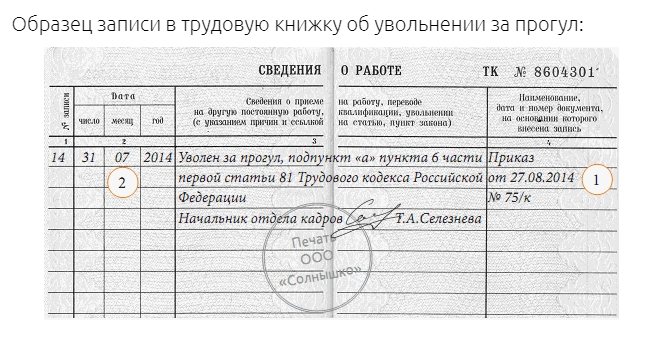Absenteeism is a significant violation by an employee of labor discipline and contractual obligations to the employer. On the basis of which, within the framework of Article 81 of the Labor Code of the Russian Federation, a senior official can dismiss his employee. Therefore, if you were fired under an article for absenteeism, read this article. A sample entry in the work book about dismissal for absenteeism in 2021 is presented in this article.

What to do if you were fired under an article
Initially, you need to make sure that the suspension from work occurred on legal grounds and was justified. If this is not the case, then you can contact:
- With a complaint to the Prosecutor's Office to conduct an unscheduled inspection.
- To the labor inspectorate.
You can also contact the judicial authority with a statement declaring the dismissal illegal and a request for subsequent reinstatement at the previous job. Even if you don’t want to work in your previous team or position, it’s still better to be reinstated at work.
This will allow you to resign at your own request. Since a reduction under the article entails negative consequences for the worker (they are unlikely to be accepted into a normal company).
Fired under article for absenteeism: what to do with labor and how to get a job?
Absenteeism is considered a serious violation of work regulations. What to do if you were fired for absenteeism? In this case, a competent approach to the situation will be required, since the option of dismissal “under article” can greatly spoil further work activity and create problems with the subsequent search for work.
What to do if your boss threatens to fire you?
Absenteeism is considered absence from work for more than 4 hours without a valid reason or for the entire shift, regardless of its duration. If the employee was indeed not at work during the specified time, then the boss may decide to dismiss. In this case, the employee should take a responsible approach to resolving the conflict situation.
There can be several exits:
- prove that the time of absence was less than 4 hours. If you can convince your boss of this fact, then dismissal will be avoided, but you will still have to bear responsibility;
- prove the existence of a valid reason for the absence.
In order to express his position, the employee has the right to draw up an explanatory note, which includes the following data:
- FULL NAME. and employee position;
- FULL NAME. and the position of the person in whose name the appeal is being drawn up;
- document's name;
- the main part of the appeal in chronological order;
- date and signature.
If the employee’s arguments satisfied the boss and his absence was forced, then dismissal will be avoided.
Even if an employee has committed a disciplinary violation, the problem can be solved in several ways:
- ask the employer to apply a different measure of influence. If the employee has not previously been noted for such misconduct, then management may meet halfway;
- ask your employer to allow you to resign at your own request.
There is a possibility that a personal conversation and an explanation of the reasons for what happened will help solve the problem as beneficially as possible for the employee.
What to do if you were fired for absenteeism?
If it was not possible to avoid an unfavorable resolution of the situation, then after dismissal you can correct the situation by challenging the employer’s decision. What to do if you were fired for absenteeism?
If the decision was made illegally, then the injured party needs to contact the labor inspectorate or court.
In the latter case, a claim is filed for reinstatement, declaring the dismissal illegal and, accordingly, canceling the entry in the work book.
For a positive resolution of the case, it will be necessary to provide a number of evidence that the termination of the employment relationship was illegal, including video and audio recordings, and witness testimony.
Is it possible to get a job if you were fired under an article?
Termination of an employment relationship due to absenteeism is unpleasant not only because the dismissed person remains without work, but also due to problems arising with further employment. How to get a job if you were fired for absenteeism?
The only solution to the problem is to convince the new potential employer that this was an accident and is not the employee’s normal behavior.
To support your words with evidence, you can use the following:
It all depends on the case, the availability of recommendations and other factors.
After dismissal under an article, it is possible to get a job, but having an entry in the work book significantly complicates the task.
Dear readers! To solve your problem right now, get a free consultation
- contact the lawyer on duty in the online chat on the right or call: You will not need to waste your
time and nerves
- an experienced lawyer will take care of solving all your problems!
How to cancel an entry in a work book?
To avoid the consequences of illegal dismissal, you can go to court with a claim to cancel the entry in the work book.
It is necessary to provide all possible evidence that the employer did not act in accordance with the legislation of the Russian Federation:
- call recordings;
- video recordings;
- testimony of witnesses not interested in the case.
If the court makes a positive decision, then the employer is obliged to enter information into the work book stating that the entry is canceled on the basis of a court decision. The employee then has the right to resign at his own request. Dismissal for absenteeism is an unpleasant situation for an employee. If absence from work is due to a valid reason, the employee must confirm this.
In case of illegal dismissal, the injured party has the right to go to court to protect their interests. If the court renders a verdict that the termination of the employment relationship was carried out in violation of the law, a decision may be made to cancel the entry in the work book, reinstatement, payment of compensation for the period of forced absence and moral damage caused.
If the record still remains, then you can get a new job, but you will have to prove that the employee will perform his duties in good faith and will not commit new violations.
Dear readers, the information in the article may be out of date, take advantage of a free consultation by calling: Moscow +7
, St. Petersburg
+7 (812) 425-62-38
, Regions
8800-350-97-52
How to avoid contract termination
To avoid termination of an employment agreement, it is worth understanding what the legislator means by the concept. You should talk about absenteeism if:
- the employee was not present at the workplace for 4 consecutive hours or during the entire shift. The worker fulfills obligations in accordance with the job description. Using them, you can determine the exact place of work where the fact of absence is recorded. According to Article 209 of the Labor Code of the Russian Federation, the entire territory owned by the organization is recognized as a workplace;
- it has not been proven that the absence is due to valid reasons.
Based on the above, an employee can get out of an unpleasant situation in the following ways:
- The employee will have to prove that if he was absent, it was for less than 4 hours in a row or this happened intermittently. It will not be possible to completely avoid disciplinary liability, but you will not be fired.
- Prove the validity (validity of reasons) for not being at work. On the way to work, manager Ivanov had an accident, while inspectors arrived, drew up a report, and photographed the scene of the incident, most of the victim’s working day had passed. When writing an explanatory note addressed to the manager, the man indicated the reason for his absence and confirmed it with a copy of the completed accident report.
Thus, if there is evidence that absence from work is justified, it is quite possible to maintain the existing employment relationship.
Is it legal to fire an employee for absenteeism?
An employee cannot be fired if:
- You were absent from work for no more than 4 hours.
- There is no entry in your employment contract about the workplace that is assigned to you. If this is not described in the contract, then absenteeism cannot be legally recorded.
- provide the employer with a medical certificate, a certificate of summons to an educational institution or to court, as well as a protocol, for example, if you get into an accident, then absence from work for a good reason is also not considered absenteeism. Even if you did not warn management about this in advance.
There are cases when it is more profitable for an employer to fire an employee who has misbehaved at work for absenteeism than to ask him to leave the organization of his own free will. And the fact of illegal dismissal can be proven, but only through legal proceedings.
Actions of the highest official
To fire you for absenteeism, the employer must:
- confirm with documents or with the help of surveillance camera recordings your absence from the workplace without a valid reason for more than 4 hours - for example, you went on vacation at your own expense without warning.
- impose a disciplinary sanction on the “truant”, in accordance with the Labor Code of the Russian Federation or the Charter of the organization.
- request an explanatory note from the employee who violated labor discipline, which should describe in detail the reason for your “absenteeism” - in accordance with parts 1 and 2 of Art. 193 Labor Code of the Russian Federation.
And after your explanations and provided documents, make a decision - to fire you or not. If, nevertheless, the decision is not made in your favor, then the further actions of your employer will be as follows:
- issue an order for your dismissal if the reason for your absence from work was not valid and not supported by any document.
- register a dismissal order in accordance with internal rules;
- familiarize the employee with this order (preferably in writing) against signature;
- reflect the reason for dismissal in the employee’s work book (“Dismissed for absenteeism, in accordance with clause 6 of Article 81 of the Labor Code of the Russian Federation”);
- leave a copy of the work book at the enterprise for the archive;
- calculate an already former employee;
- issue a certificate 2-NDFL.
Rights of a dismissed employee
If you understand that you did not come to work consciously, then it is better not to delay the process of proceedings with your superiors, but write a statement of your own free will or urgently go on sick leave. Then you will protect yourself from possible adverse consequences for you.
But if you know for sure that you were fired illegally under an article for absenteeism, then you have the right to contact the labor inspectorate, prosecutor’s office or court and find out the real reasons for the unilateral termination of your employment relationship.
You have the right to be reinstated - but only by court decision. If the court recognizes the fact of violation of your legal rights, then the boss will be obliged to pay you compensation for the entire time of your absence while the legal proceedings were ongoing. You can also demand restoration of your seniority and moral compensation, since you could not get a job for a long time due to an entry in the work book.
Moreover, a senior official can be held accountable under Art. for illegally dismissing an employee. 5.27 Code of Administrative Offenses of the Russian Federation. In exceptional cases - under Art. 145 of the Criminal Code of the Russian Federation.
If you and your employer still have additional controversial situations, you must be guided by the Resolution of the Plenum of the Supreme Court of the Russian Federation No. 2 of March 17, 2004 and the Labor Code of the Russian Federation.
Explanatory letter
There is no generally accepted form for explanatory notes. However, the document must include the following information:
- personal information about the manager, name of the organization;
- personal information of the employee, position held;
- indicate the word “explanatory” in the center of the sheet;
- justification for absenteeism, indication of valid reasons;
- date and signature of the document originator.
Evidentiary paper support must be attached to the document. If the worker was summoned to a judicial institution or to the investigative department, then a summons is attached indicating the time period during which the person remained in the institution. All of the above is suitable if the employee is not actually guilty of absenteeism.
Consequences of dismissal under article
When a company employee is suspended from duty for absenteeism, both the reason and the article of labor legislation are indicated in the work book. Having looked at the document, a new employer can immediately draw conclusions. Not every manager is ready to entrust a responsible position to a truant. There is a common belief that people don't change. There is no guarantee that the applicant's behavior will improve.
Often behind such dismissal there are illegal actions of the employer, but due to the employee’s legal illiteracy, the manager remains unpunished.
Reflection in the work book
A note in the work book about dismissal due to absenteeism is considered the final stage in the entire procedure. The document states:
- record number;
- the date of reduction coinciding with that specified in the order;
- Article 81 of the Labor Code of the Russian Federation is indicated as a basis;
- signature of a HR employee and company seal.
The document with the entries made is given to the worker on the last day of work. If the employee does not show up for work, then a notice is sent to him. If they never came for the book, it is kept by the employer.
How to legally fire an already employed employee?
We learned how to legally refuse applicants at interviews in previous articles. But sometimes there is a need to fire an employee who has already been working (sometimes for many years). The reasons for this may be different: conflict, the emergence of a more knowledgeable and skilled applicant for this position (given the changed realities of the company), changes in the characteristics of the company, etc.
As an example, it is worth citing the history of one company. When the company was just starting out, they hired an accountant who “made a revolution” by installing some kind of accounting system. However, when the company grew into a large holding with several divisions, it turned out that it could not fully cope with its tasks. After all, in order for accounting to run smoothly in such a “giant,” it is now necessary to manage people performing smaller tasks. And this comes down to management skills that the accountant did not have. As a result, work began to stall. There was no point in leaving such an accountant, despite the fact that he had worked for 10 years for the benefit of the company, because... it is unknown whether it would have grown to the required level or not. How the dismissal was carried out will be discussed below.
It’s worth remembering here that there are a lot of protective articles in the labor code that do not allow you to fire someone “for a good living.” Therefore, sufficiently compelling reasons should be found to dismiss an already employed employee.
Dismissal at your own request.
The most common practice among employers is to talk to the employee and invite him to write a letter of resignation of his own free will.
Usually, in order for care by agreement of the parties to be easy and painless, the employee must be paid a very significant amount (usually at the level of 2-3 salaries).
Often, the employer offers this method of separation to unreliable employees (late, absenteeism, drinking), provided that their behavior of this kind could not be recorded.
However, history knows precedents when employees dismissed in this way successfully won in court. Usually the matter ended with the employee being reinstated, or he sued the company for quite significant sums.
Therefore, you should immediately offer voluntary resignation only to those employees in whom you are confident. If you are not confident in the employee, then it is better to dismiss him for the reasons provided for by law. These include the following factors:
Voluntary departure due to changes in working conditions.
These conditions are, as a rule, schedules, procedures for performing duties, job descriptions, as well as forms of remuneration. The Labor Code allows such changes to be made by notifying employees no later than two months before making them. In this case, the employee’s disagreement and his subsequent dismissal will not entail any serious legal consequences for the employer.
Voluntary resignation due to the disappearance of a vacancy and the emergence of a new one.
Usually practiced during layoffs, when a company announces its intention to reduce staff. When reducing just one vacancy, the employer must, firstly, not open the position (which he is reducing) for at least a year. Secondly, he is obliged to offer the applicant an alternative position (either in his company or), consistent with a reduced level of qualifications and pay. And only if the employee refuses the proposed alternative can he be fired. Such refusal must be in writing. Here it is worth dwelling on several common mistakes made by employers. The first is early dismissal (that is, until two months have passed from the date of notification). The second is dismissal on time, but during the employee’s illness. An employee can only be laid off when he returns to work. Third, dismissal of an employee before obtaining his consent or refusal. Fourth – untimely approval of the new staffing table. On all these points, a dismissed applicant can quite easily win the case.
There are categories of workers who have advantages when being laid off (that is, they either cannot be laid off at all, or can be the last thing). This:
- women who are at one stage or another of pregnancy;
- women raising a child under 3 years of age (no matter, alone or with a husband);
- persons who are the sole breadwinner in the family, provided that the other relative living with them does not have a documented source of income;
- single parents raising children under 14 years of age, or disabled children under 18 years of age.
It is also worth remembering that workers who are members of trade unions can only be laid off in agreement with the primary trade union organization.
Unsuitability.
It is clear that if an employee works in a company for a long time, his professional suitability is beyond doubt. Therefore, it is possible to prove unsuitability only by introducing new requirements and standards for the existing position. This is done in the following order:
- the employee is warned about changes in the job description and about the imposition of new responsibilities two months before the implementation of these innovations;
- then, in the “Additional agreements” paragraph, criteria for assessing the employee’s success in fulfilling new duties are prescribed. That is, by what criteria is it considered that he copes, and by what criteria is it considered that he fails to cope with his responsibilities;
- Next, the success of the work is measured according to the prescribed indicators;
- on the basis that the employee “does not comply” with the new requirements, he is given a written reprimand twice, after which dismissal occurs.
This is exactly what was done in the case with the accountant mentioned above. She was notified of the change in her job description two months earlier. The changes consisted in the fact that she was charged with managing a staff of accountants and forming a cohesive team capable of achieving the intended results. And then they offered to write a statement of their own free will, because... otherwise, her professional incompetence will be proven. In the end, she chose the first option of dismissal.
Failure to pass certifications, exams, qualification tests, etc.
Clause 3, Part 1, Art. 81 of the Labor Code of the Russian Federation states: “inconsistency of an employee with the position held or work performed due to insufficient qualifications confirmed by certification results.” That is, it is allowed to dismiss an employee if he fails to successfully pass certification and does not agree to take another position in this company. Here the legislation allows the following procedure:
- approval of the local act on certification;
- providing employees with time to prepare;
- meeting of the certification commission;
- determining the certification procedure;
- selection of undeniable arguments about insufficient qualifications based on the results;
- offering another position to an employee in the same company.
Often, courts require re-certification, which is why it makes sense to conduct such tests twice with an unsuccessful outcome (for the employee) in both cases.
This is one of the longest and most labor-intensive methods of dismissal, although it is quite reliable with the right approach.
Absenteeism and tardiness.
The Labor Code allows you to automatically dismiss an employee who is absent from work for at least one working day, or for more than 4 hours in a row. Absenteeism is considered absence from work without appropriate warning from the immediate supervisor.
In fact, it is quite difficult to fire someone for even serious absenteeism for the first time, since in such cases the court is usually on the side of the applicant according to the logic “Well, he stumbled once, it doesn’t happen to anyone.”
And in order to increase the likelihood of winning such a court hearing, it is necessary to collect documents confirming the employee’s dishonesty in relation to internal regulations. An example of such documents could be a written reprimand, explanatory notes, data on recording the arrival and departure of employees from the checkpoint, etc.
Thus, the following incident occurred in the Altai Territory: after an employee was fired for absenteeism, he contacted the labor inspectorate. During the inspection, the dismissal for absenteeism was challenged, because employer:
- did not request a written explanation from the employee regarding the fact of absence from work (thus, without confirming the fact of recording absenteeism);
- did not provide evidence of the employee’s absence during scheduled hours.
As a result, not only was the employee reinstated to the company, but the company was also fined an impressive amount.
Frequent tardiness is also a good reason for dismissal. But in their case, documentary evidence alone may not be enough for the court - it is also necessary that the exact time of arrival and departure of employees is clearly stated in the internal charter of the company.
For dismissal due to lateness, a commission of disinterested persons is assembled and a report of lateness is created. After this, the employee is asked to write an explanatory note, and in case of refusal, a corresponding act is drawn up, which is signed by the manager, an employee of the personnel department and members of the commission.
Based on such acts, written comments are drawn up, which can subsequently be attached to the reprimand, thanks to which the dismissal can be carried out calmly.
In general, any dismissals due to employee shortcomings must be formalized legally as competently as possible. Because in this case, the likelihood of the dismissed person filing a claim is as high as possible. After all, such a “parting” with work is associated with the appearance of a corresponding entry in the work book, which will subsequently greatly interfere with getting a job.
Intoxication.
Even coming to work once while under the influence of alcohol or drugs is a valid reason for dismissal. However, the testimony of witnesses alone (even if they have nothing to do with the company) is not enough. A mandatory argument for the court in this case must be the documented results of a medical examination. That is, in fact, when an employee goes to work in this condition, they will have to call an ambulance, which will record the results of the examination in the appropriate certificate.
It is worth considering that a person has the right to refuse a medical examination. And in this case, his refusal and state of intoxication must be recorded in writing by a special act, which describes the signs of intoxication.
Failure to fulfill duties and failure to comply with internal regulations.
In order to be able to fire a person under this point, it is necessary first for the employee to sign documents stating that he is familiar with the dress code, work schedule, standards of behavior and communication within the team.
As in previous cases, it is necessary to have written comments and reprimands regarding repeated violations of corporate procedure. It will also be necessary to provide the court with objective evidence of violations, which may be photographs and video footage, evidence from employees, as well as from persons not related to the company (security guards at the entrance to the business center), etc.
Disclosure of trade secrets.
This is one of the most serious grounds for dismissal, although the problem here is that the concept of that very trade secret can be interpreted very broadly. If we take this to the point of absurdity, then a trade secret could even be a list of empty containers in the warehouse and its volume.
In this regard, the provisions of Article 139 of the Civil Code define a trade secret as information that has value due to its unknown to third parties and its absence in the public domain. A prerequisite is its security.
Before dismissing an employee on this basis, you must ensure the following:
- whether the information, the disclosure of which occurred, is documented as protected by law and not subject to public disclosure;
- whether the employee is familiar with these documents and whether his signature is on them;
- which confirms the fact that it was this employee who made secret information public.
And only the presence of evidence confirming the fact that the employee disclosed secret information, as well as a signed non-disclosure agreement, will allow for a smooth dismissal with minimal risk of challenging it in court.
Note that dismissal under any of the articles is in any case less preferable than severing the employment relationship by voluntary consent.
Firstly, practice shows that this involves large expenses. Typically, the costs of a lawyer, collecting evidence and a court hearing significantly exceed the amount of severance pay.
Secondly, damage to relationships is fraught with the fact that a former employee may write negative comments and reviews about your company on social media. networks, forums, websites and other resources. This also risks the fact that, being forcibly fired, he can leak your trade secrets, production algorithms, etc. competitors.
Rating 0/5 (0 Reviews)
How to get a new job
An entry in the work record book about absenteeism can greatly damage the reputation of the applicant and cause distrust on the part of the new management. The person will be forced to convince the prospective employer that the incident was accidental or innocent. You will need to actually prove your professional level and the presence of a responsible approach to your work responsibilities. This can be done using the following methods:
- Ask for a trial period. In accordance with Article 70 of the Labor Code of the Russian Federation, an internship can last up to 3 months, and for categories of workers with an increased level of responsibility - up to six months. The management may agree to this option, since it will not be difficult to fire an unsuitable candidate.
- As an accident or evidence of unlawful actions of the previous management, you can provide references and recommendations from previous places of employment. This will give the new employer the opportunity to objectively assess the situation.
Recording the fact of absenteeism in a document is not considered a sentence. Much depends on the actions and activity of the employed person.
What to do if your boss threatens to fire you
If the head of an organization threatens to fire him at any opportunity, and, moreover, the threats are groundless, then the correct model of behavior should be built:
- carefully follow the job description and fulfill all duties stipulated in the employment agreement. However, there is no obligation to go beyond the contract and work overtime;
- if there is written documentation about the facts of violations by the employee, if possible, respond to them with a refutation (also in writing);
- collect evidence about the threat of dismissal in the event of a conflict and actual dismissal;
- if there is a desire to fire a specific employee, then provocations may follow - accusations of drinking alcoholic beverages, being late, absenteeism. In the first case, you need to demand a medical examination, in the rest - to document the reasons for being late or absent from work.
Going to court
In cases where employees consider their dismissal to be illegal, they can file a lawsuit to cancel the dismissal order. Most often they talk about the following reasons:
- Application by the employer of two types of punishment for one offense. The employee is first reprimanded and then fired.
- Violation of deadlines. The employee was not given time to provide an explanation, or the order was issued more than a month after the disciplinary violation.
- Refusal by employers to accept supporting documents.
- Termination of an employment contract due to absence from work with an employee who is sick.

During the trial, all documents related to the dismissal of a particular employee are seized. The applicant also provides all supporting documents that he has. Based on the results of the proceedings, the court may decide to cancel the illegal order. In this case, the employee will be reinstated. A corresponding entry will be made in the work book.
Employer's liability for unjustified dismissal
Illegal behavior of the employer is punishable by penalties established by law:
- A fine for an official in the amount of 1000 to 5000 rubles. according to part 1. Article 5.27 of the Code of Administrative Offenses of the Russian Federation.
- An individual entrepreneur is also subject to a fine in the previously specified amount, and an additional measure to suppress illegal behavior may be suspension of activities for up to 3 months.
- For a legal entity, the fine increases - from 30 to 50 thousand rubles. A ban on conducting the case for 90 days is also possible.
Moreover, the employee must be reinstated and paid for lost wages for forced days of absence.








